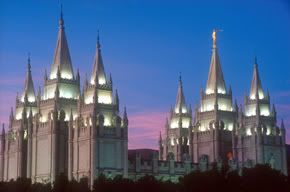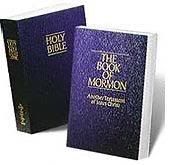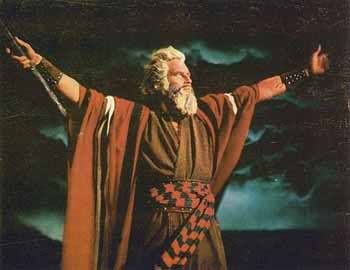 PBS aired a 2-PART Frontline/American Experience documentary by Helen Whitney entitled "The Mormons ." The purpose of the documentary was to define the Chruch of Jesus Christ of Latter-day Saints and its religious, social, and historical context. After seeing the documentary, I admit, I'm not crazy about it. There were a few things I liked, there were many things I didn't like. Principly, I didn't appreciate Whitney using so many marginalized, disaffected, excommunited, antagonistic, or otherwise unassociated people to define who we are. So, I decided to come up with my own version of what I feel it means to be Mormon.
PBS aired a 2-PART Frontline/American Experience documentary by Helen Whitney entitled "The Mormons ." The purpose of the documentary was to define the Chruch of Jesus Christ of Latter-day Saints and its religious, social, and historical context. After seeing the documentary, I admit, I'm not crazy about it. There were a few things I liked, there were many things I didn't like. Principly, I didn't appreciate Whitney using so many marginalized, disaffected, excommunited, antagonistic, or otherwise unassociated people to define who we are. So, I decided to come up with my own version of what I feel it means to be Mormon.
True Foundation Principles
Jesus Christ
Jesus Christ really is at the center of this religion. I you could hear Joseph Smith speak, what would he say? He would bare testimony that he saw the living resurrected Christ. Every member accepts Christ as their personal savior and seeks to apply the atoneing blood of his sacrifice. We try to follow Christ's teachings and example in every aspect of our lives. We teach of Christ, we prophesy of Christ, we pray in the name of Christ, we do everything in the Church in the name of Christ. This has been so, unaltered since Joseph Smith. Joseph Smith was inspired to name the church, The Church of Jesus Christ of Latter-Day Saints.
Some in the media claim that Mormons tried to recreate themselves in the 1990's to re-emphasis the place of Jesus Christ in our church. All that happened is that our logo changed to better reflect the centrallity of Christ in our doctrine. Nothing changed doctrinally in the church. The doctrine has remained the same. We didnt change the Book of Mormon, or the Doctrine and Covenants. These works of scripture speak and testify of Jesus Christ on every single page.
Many evangelical churches have tried to exclude us from being considered mainstream Christian. I think this is rather unfair, really. The basis of this is because our 1st centry christian definition of the God Head differs from their 4th-century, non-biblical, creedal-christian definition of the trinity. We do not accept the ecumenical creeds of the Catholic church. They are not inspired doctrine. We believe that Bible, the Book of Mormon and the modern revelation which teaches that Jesus Christ is the literal Son of God. He is a completely seperate and distinct individual from God, our Heavenly Father. Jesus Christ was born of Mary, he lived a perfect life, he paid for the sins of the world, he died on the cross, resurrected, assended into heaven to stand in the right hand of the Father and is considered one in purpose with the Father. He now serves as the great mediator between God man. He is the only way to gain salvation and eternal life.
Revelation
"It's all about revelation with these people." A Mormon believes that this life, in comparison to eternity, is a brief test to see if we will accept and do the will of God. And everyone will one day stand before God and make an accounting of his/her actions, thoughts, and desires. Mormon's then make knowing the will of God an absolute necessity and supreme priority. Therefore, there are very important mechanism in place for an individual to obtain God's will. Mormon's believe they can know the mind and will of God through the scriptures, through the living prophet, and through personal prayer and revelation.
The church has always taught me to study things out in my own mind" and warned not to "subsist on barrowed light." For example, when others tried to give Brigham Young credit for organizing the mass migration of the saints to Utah, Pres. Young always deflected that praise; instead attributing the migration's success to the "burning testimonies" in the hearts of each individual saints. Nothing but that burning testimony could have inspired my wife's ancestors to leave their homes in England and travel over the ocean to America, travel over land to Missouri and then walk 1000 miles to Utah desert. These people had never even met Joseph Smith or Brigham Young.
Living the Scriptures
Mormons don't just read the scriptures, they live the scriptures. When the Bible talks about Christ making Adam and Eve garments to cover their nakedness, Mormons don't just talk about that story, they wear actual clothing which represents the clothing spoken of in the Bible. And its the same with prophets, apostles, temples, commandments, priesthood, revelations, miracles, etc. The same God that was calling prophets, and performing miracles, and revealing scripture in Bible times is doing those same things in our time. And when the Bible talks about building a perfect Zion society that Christ will recieve at his coming, Mormons have every intention of being the ones who will build it.
Also, the church doesn't have a paid ministry. Anyone could be called to the Bishop or bishop's wife, relief society president or husband of a relief society president. The point is, in the Mormon church, there isn't a divide between the pastor and the congregation. And that translates to the scriptures. When we read about Adam, Abraham, or Moses, every member is an Adam or Eve, every member is an Abraham, every member is a Moses, and every member through Christ can become like God.
The Temple
Just as the temple in Jerusalem was the symbol and focal point of Jewish worship, the Temple remains the central focus of true Christian worship. What is the purpose of the temple? It is the house of God. One who enters the temple feels like he has left the world and is entering the presence of God. The temple helps members regain their bearings, direction, and eternal perspective. In the temple, a member is better able, than at any other time, to distinguish and discern between his own feelings and thoughts and the still small voice of God's Spirit.
In the temples, husband and wife, parents and children are married or sealed "for time and all eternity" and not just "for as long as you both shall live" or "until death do you part." My wife and I are the proud parents of 3 beautiful children. However, between child 1 and 2 we suffered a fetal demise at 32 weeks gestation. My wife and I have never gone through a more emotionally difficult time. All I can say is, when I needed my faith to support me, the promise of an eternal family delivered the peace, hope and comfort I needed during one of the most difficult chapters in my life to date. There is no other doctrine that can supply the comfort, peace and hope in the face of death like the doctrine of the eternal family.
Ordinances such as baptism, ordaining to the priesthood, marriage sealings are also done by the living on behalf of the dead. This does not automatically make the deceased person a Mormon. Ordinance work by vicarious proxy simply and wonderfully supplies and satisfies the necessary celestial technicalities of baptism and other ordinances which the Bible teaches are necessary to enter into eternal life to only those who accept the work of their own free will and choice while in the Spirit Relm and before resurrection. The work is only valid if that person accepts it.
The Worth of Souls
Mormons believe in a glorified corporeal God and in a literal physical heaven on Earth. We believe that all men of every race have an Eternal destiny and potential. Therefore, the worth of a single soul is incalculable. The Bible says to lay up in store treasures in heaven. And Mormons believe that family relationships and friends are just such treasure that we can take with us into the next life. God is love, so our ability to love others is the most essential characteristic we can develop. This is why Mormon's devote themselves to service to their fellow man. We try to follow Christ example and heed the Bible when it says to care for "the fatherless and the widow" and to "lift the hands that hand down and strengthen the feeble knees." This is part of the reason why the Mormons have such an extensive and world-renound welfare and disaster relief program.
History and Legacy
I agree that Mormon history strongly influences and molds the identity of modern Mormons. We sing songs about the pioneers, we tell their stories of suffering, testimony, sacrifice, and persecution. From New York, to Ohio, to Missouri, to Illinois, and then the exodus to Utah. These are powerful stories which bind us together to a common heritage whether we have pioneer ancestory or not. Every member is a pioneer, every member is a missionary. And when it comes to our dirty laundry, we accept it, we own it, we learn from it, and move on.
Families
Families are central to Mormon life. The church functions to support the family in its primary role to help bring about the exaltation and eternal life of each member. Fathers and mothers look consider their family to be the source of their greatest fulfillment in life. No other worldly persuit or honor could suplant the family. Mormon's champion the tradition family and the traditional roles of men and women as fathers and mothers. Fathers have the primary duty to work outside the home, be the "breadwinner" and look after the spiritual and temporal needs of his family. Mothers are to work inside the home and look after the emotional and social needs of the family.
Fathers and mothers have the priniciple responsibility to teach their children the doctrines of the gospel. Monday nights are reserved for family home evenings were parents have the opportunity to teach their own children, and share their testimony with them about the Mormon faith. Families are also strongly encouraged to pray and read scriptures together on a daily basis.
The Mormon household is patriarchal but not paternalistic. My wife and I are equal partners and make all important decisions together. I would never dream of making a desion alone without my wife and telling her "this is what the family is doing, I'm the father, I make the rules." That is not how the church works, that is not how a Mormon home works. Because if something went wrong then I'd have my wife looking at me saying, "Well, good going, this is all your fault, I never wanted to do this in the first place." However, as we make decisions together, study, ponder, and pray to know the will of God and make a united decision. Then when the going gets tough we can say instead, "Hey, we made this decision together, we felt like its what God wanted for us, it's tough. But if we have faith and pray for help and endure, it's going to turn out well in the end." I have always made decisions this way, and so have my parents and it has never failed me.
The Mormon faith gives me a confidence and hope in raising my children. I know that if I follow the program of the church, the scriptures, and the counsels of the prophets and apostles that I can expect when I'm 60 years old, to be still in-love and happily married to my wife, with a quiver full of educated, successful children who are productive and contributing members of society and who have been spared the terrible physical, emotional, social, and spiritual consequences of alcohol, tobacco, drug addiction and sexual promescuity and unfaithfulness. I can also look forward to armfulls of grandchildren who will come to visit me and whose love I will enjoy.
Priesthood Restoration
Where does the Mormon church fit in with the rest of Christianity. The Mormon chruch isn't a protestant church. We are not a branch off the catholic church. We are a 100% restored church. When Joseph Smith went into the grove of trees to ask which church to join, he didn't expect to learn that he should join none of them. He thought one would possess the truth. He later learned that the priesthood authority to administer the true church of Jesus Christ had been taken from the Earth after the dealth of Christ first Apostles and the world had fallen into Apostasy and the Dark Ages. Joseph Smith would be called by God to be his instrument to restore to Earth the priesthood authority, new scripture, and all the doctrines which make up the true chruch of Jesus Christ. The chruch of Jesus Christ is organized in the same way as Christ church was with a prophet, 2 counsellors which make up a first-presidency of 3 members and a quorem of 12 Apostles.
All Mormon men are given the previlage of recieving the priesthood and administering in their congregation and in their own families. Faithful fathers who hold the priesthood can administer and give blessings to their own wife and children when they are sick and also perform ordinances such a baptism and conformation as well as ordain their own sons to the preisthood when they are of age and worthy of it. Woman are not given the priesthood and given callings as bishop or pastor because the time required outside the home to perform those duties would detract from their primary responsibility as mother within the home. Women do serve in the temple, officiate several temple duties, and serve in presidencies over the relief society, young women, and primary under the direction of the priesthood.
Let me just tell you that if you want to know what is going on in a particular congregation with the individual members, the person you need to contact is the relief society president and not the bishop. She and her presidency have the pulse of the ward. They meet withe the bishop on a weekly basis to tell him the needs of his ward and give recommendations on what to do. It is this way throughout the church and always has been this way.
Church Fellowship
The church takes care of its members from the cradle to the grave. Children are not baptized until the age of accountability at age 8. All children who die before the age of 8 are considered innocent and automatic heirs to salvation, eternal life, and exaltation. Fathers instead can bless and name their infant children.. This is an opportunity for the parents of a child to present their infant before the Lord, dedicate their child to the Lord, and bless that child with those things the Holy Spirit isnpires the father to bestow upon his own child during the blessing.
Children grow up from nursery to primary. Primary children sing beautiful Christ-centered songs such as "I am trying to be like Jesus," "I am a child of God," and "Choose the Right." These songs teach powerful principles of faith, repentance, and obedience through the power of music.
After primary comes young men and young women. The program for young men is the scouting program. Young Men learn some of the skills and discipline they will need to take their place as fathers, good neighbors, patiotic citizens, and devout disciples of Christ. Young Women have a program of goal setting and service where they focus on the core values of womanhood and how they can make a difference to their children, neighborhood, and community through charitable service. Young men and women are strongly advised to not date until age 16 and to not go steady until college or after a mission.
Men and many women then go on missions between the ages of 19 and 21 at their own expense. They pay their own way 100%. The mission is fulltime for 2 years. They do not select where they will be called. Prostpective missionaries are interviewed for worthiness, they then put in their papers declaring their willingness to go, and then they go whereever in the world they are sent. I served a spanish-speaking mission in Wisconsin. I have other friends who went to Brazil, Siberia, Tailand, and Mongolia. The mission not just a right of passage, it is a transformative period where boys leave and come back men. Missionaries are always with a companion for saftey purposes. Some are injured or killed but at significantly lower rates than if they stayed at home and never went.
On their mission, if they havnt already, missionaries kindle the fire of their own testimonies of the restored gospel of Jesus Christ. They see the transformative effects of the gospel not only in themselves but also in those they teach. I witnessed people the most miraculous transformations to follow the example of Jesus Christ. Return missionaries are then so much better focused and mature that they are so much more prepared for college or other professional training. Many also come back with invaluable language skills and are used by the United States Armed Services, CIA, NSA, and FBI as linguists, and translators.
Highschool-age young men and women attend 4 years of formal religious study known as "Seminary." Then during college and graduate school the rhuch continues their relgious study in its Institute of Religion. All graduates from BYU or other school with an Institute of Religion graduate with an equivalent of a minor in religious training. There are also classes taught which cover important family subjects such as marriage and child development.
I attended Brigham Young Univeristy, the president of BYU makes it a yearly tradition of noting when the top10 US Party Schools list is published to point out that BYU was yet again rated the #1 stone-cold sober college campus in the US. BYU and other LDS-sponsored schools are an amazing place to be educated. I will never forget waking up early each Sunday and looking out my window and seeing a flood of thousands and thousands of young men and women, all dressed up in whites shirts and ties or modest blouses and skirts streaming onto campus to attend chruch. The same classrooms which were used to teach English, Physics, History and Math during the week are used to host sacrament meetings and sunday school on Sundays. There are no parents looking over your shoulder in college, but here are these students choosing to live up to the gospel standand because of the "fire" of their own testimony buring within their hearts.
BYU also has a strict honor code and curfue. I will never forget the many occasions when the clock would strike midnight and I would excuse myself from the apartment of a particular young woman of interest only to find other young men stepping out of the apartments of other young women at that same exact moment. The group of us would then walk back to our apartments together and talk about the night's events and converation. It just felt amazing to be with so many others who were as excited to live their faith as I was.
I am now married to one very special young woman of interest that I met at BYU and we know have 3 children. We along with all of our friends choose to abstain completely from any and all sexual activity before marriage and have committed ourselves to complete fidelity within our marriages. We don't look at pornography, we do not drink alcohol, or use tobacco, or drink coffee or tea, or use any other addicting substance. Because of the standards, values, and morals of the church, I feel I have been saved from so many of the plagues which have destroyed the lives of many of my non-member associates and friends. I happily give up some of my freedoms for the good of society; for the good of others who may not be able to drink responsibly and who would then become addicted and fall.
As a father, the church cares for me by its program of home and visiting teachers. Wherever you go, 2 men and 2 woman are assigned to visit you and your wife each month. They are there for any problem that may arrise. If my wife is having a baby or sick they are ready to prepare meals for a few days or babysit the children or do anything else that is needed. These home and visiting teachers serve as the eyes and ears of the Bishop. Problems, needs, or issues get relayed back to the bishop immediately. Gossip is absolutely discouraged.
An Anchor of Faith
The church has been criticized for not evolving with the world and being more accomidating. to a few small groups such as intellectuals, feminists, and gays who feel marginalized. A few outspoken members or excommunicated complain that the chruch should change to accomidate their ideas and their lifestyle. They clainm that it is unfair that the church is so strict with its rules and doctrines and that that strictness causes them such pain and anguish. They ask how a church that claims to be Christ-like could be so insensitive. Therefore, they would have the church change to accomidate them.
But that is not how the church works for the rest of us. The church works because it doesn't change. Everything in the world is evolving and changing. The chruch of Jesus Christ stands as a lighthouse, a beacon, a light on a hill, an anchor of faith, and a firm foundation. The same teachings and doctrines that are taught in church today were taught by Joseph Smith himself. With exception of Blacks and the priesthood and polygamy there has not been a significant doctrinal or organizitional change in the church since Joseph Smith's martyrdom. And anywhere you go across the Earth, when you attend an LDS meeting you will hear preached by the members of the church the very same doctrine, and hear the very same testimony of Jesus Christ, and the Book of Mormon and of Joseph Smith. There is and will be no variation of doctrine.
Those vocal few who have been excommunicated choose to stay out of the church. They choose to hold onto their pet idealogy or their perverted sexual desire, thinking they know better than everyone else, better than scripture, better than the prophet what is God's will. But the church knows better because Christ himself is at its helm. The chruch will never accomidate certain behavior. The church didn't leave them. They left the church; but they are welcome back at any time. The church has survived and it will continue to survive because it is constant and immoveable by man. This is why the church is prophesied to fill the Earth. It is the stone Daniel saw cut out of the mountain without hands that rolled forth and grew larger and larger until it filled the Earth.
 Many Christians refuse to even consider the Book of Mormon because of what they consider, a lack of archeological evidence to support it's setting and events. This is also what is know as a presumed problem of "historicity." The Book of Mormon's mention of steel, for instance, is considered an example of one of its major flaws. However, I think this minor bit of trivia will prove to be one of the Book of Mormons more fascinating evidences.
Many Christians refuse to even consider the Book of Mormon because of what they consider, a lack of archeological evidence to support it's setting and events. This is also what is know as a presumed problem of "historicity." The Book of Mormon's mention of steel, for instance, is considered an example of one of its major flaws. However, I think this minor bit of trivia will prove to be one of the Book of Mormons more fascinating evidences. When I ask my devoted and faithful Christian friends to characterize their faith and beliefs in comparison to the beliefs of others, they invariably give 2 answers: (1) I don't believe 100%, everything that my preacher or religion teaches, (2) I believe the Bible 100% while everyone else picks and chooses what they want to believe from the Bible.
When I ask my devoted and faithful Christian friends to characterize their faith and beliefs in comparison to the beliefs of others, they invariably give 2 answers: (1) I don't believe 100%, everything that my preacher or religion teaches, (2) I believe the Bible 100% while everyone else picks and chooses what they want to believe from the Bible.





 I feel that what makes the LDS Church different that any other church is that its members are expected to question every doctrine. Now, when I say question everything, I do not mean doubt everything. There is a proper way to "study [principles] out in your mind." Proper experimenting and questioning should not be considered doubting and is never done through rebellion, contention or descent.
I feel that what makes the LDS Church different that any other church is that its members are expected to question every doctrine. Now, when I say question everything, I do not mean doubt everything. There is a proper way to "study [principles] out in your mind." Proper experimenting and questioning should not be considered doubting and is never done through rebellion, contention or descent.











